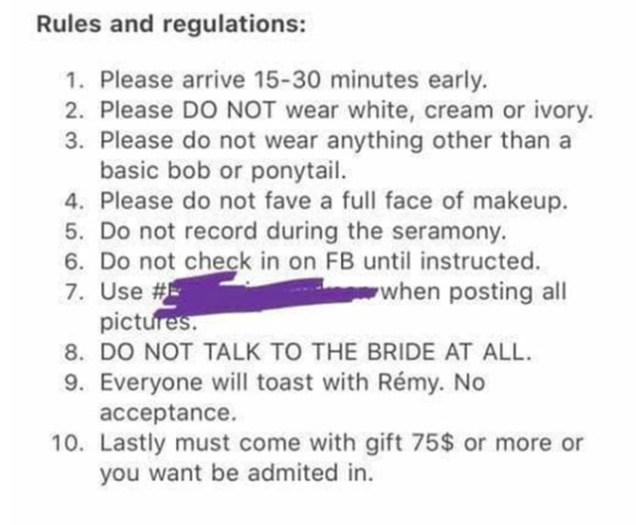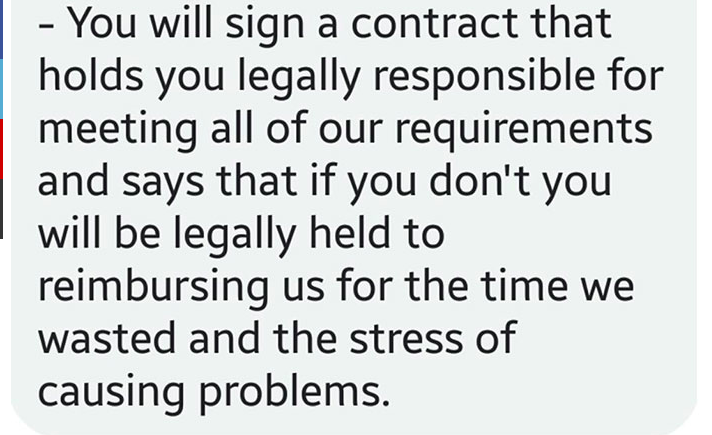When it comes to milestones in life, getting married, for most, is probably at the top of the list. After all, it’s “your big day”, and since all eyes will be on you, the glowing bride, you want everything to be picture-perfect as you sashay down the aisle. But striving for perfection comes with a tremendous amount of pressure, and that can manifest in various ways. While most brides take it in their stride, some brides (and even grooms, for that matter) become unbearably demanding and morph into the dreaded “bridezilla” while planning a wedding.
Some even go viral for all the wrong reasons and send out ridiculous rules and regulations like this:
Scary, right?
LAW FOR ALL has decided to play wedding planner and look into various scenarios of brides taking a turn for the worse. It’s all about putting things into perspective and helping you avoid sticky situations and encounters with the law while planning a wedding.
1. Paying for the wedding.
Weddings are costly; in fact, the average cost for all the glitz and glam of the ceremony can be between R150 000 and R650 000, according to W24. And, as we all know, money causes a lot of stress and tension.
Traditionally, it’s understood that the bride’s side of the family pays for the wedding, but that’s based on archaic “rules”, and they are not legally obligated to do so. As Mona-Lisa Snyman, a family law expert at LAW FOR ALL, points out, there is no legal obligation on the parents of a bride to pay for the wedding expenses. “Essentially it remains the responsibility of whoever enters into the agreements with the suppliers – whether it’s the venue, flowers or other expenses – to pay for the services”.
Ultimately, while planning a wedding, you want to avoid any unnecessary conflict with your family or soon-to-be in-laws. And you certainly don’t want to take a page out of a book from a UK bride who went through great lengths to know how much money her future mother-in-law was earning because she wanted to ensure she contributed enough to the wedding.
There is no need for extensive detective work: be sure to have open and honest conversations about the wedding expenses and who will be contributing what.
“It’s also advisable to create a legally binding document that sets out who is responsible for paying for what. Remember, if you are going this route, it’s good to enlist the help of a lawyer,” adds Snyman.
2. Being overly demanding of invited wedding guests or the bridal party
In 2018, an Australian “bridezilla” was called out by her own family on social media for her absurd wedding requirements and demands while planning a wedding. Not only did her guests have to pay for their flights and accommodation, but also their food, alcohol and cake. Not to mention, they were strongly encouraged to help fund the couple’s honeymoon!
But, guests RSVPing to your wedding does not necessarily mean they accept the terms of a legally binding contract that holds them liable to any demands.
“Traditionally, guests aren’t expected to fund someone’s wedding or honeymoon. From a legal perspective, there must be a serious intention to create a legal obligation. For a contract to exist, the bride and groom have to make a clear offer and establish clear terms that must be accepted, unequivocally, by guests. Only then could guests potentially be held liable. But, it is a big “could” because an invitation in and of itself isn’t considered a legal document, and if it gets to the point where the matter goes to court, it could be thrown out.
In another viral post, the sister of a bride-to-be shared her sibling’s outrageous requirements for friends who want to be in her bridal party. To secure a spot in her bridal party, contenders needed to complete tasks, purchase gifts and… wait for it… sign a contract that holds people “legally responsible” for meeting all the requirements.
Needless to say, do not do this and turn your wedding into a bizarre competition!
3. Unrealistic expectations from vendors
In the hustle and bustle of getting everything sorted for the wedding and reception, you may have forgotten about what you agreed to with certain vendors. “It’s highly recommended that you are discerning about which vendors you choose and get any agreements in writing,” says Snyman. In South Africa, the Consumer Protection Act protects brides and grooms’ rights to receiving quality goods that are free of defects and fair terms and conditions. “The couple has the right to examine goods, receive a detailed quote and breakdown of the financial obligations with the supplier. The terms of an agreement to supply good or services may not be unfair or unreasonable. If the goods are defective it can be returned and ask for replacement, repair or a refund,” maintains Snyman.
Not to mention, if services are of poor quality or not completed in time, the bride can ask that the supplier correct their mistake or provide a refund depending on the extent of the error. If the supplier doesn’t budge, the couple can go to an Ombudsman, or lodge a civil claim.
“However, but if the goods or services are offered in a certain condition and the bride accepted that, she cannot claim that it was defective and withhold payment or she could face legal action,” clarifies Snyman.
On the other side of the aisle, the bride’s consumer rights are also protected. If any of the vendors don’t fulfil their side of the contract, you could take legal action against them. In early 2010, a Cape Town couple took a caterer to the Small Claims Court for “ruining” their wedding with awful food.
Don’t lose perspective… remember what the day is really about
It’s perfectly fine to want a fairy tale wedding, but you shouldn’t lose sight of the fact that it is mostly about showing your love and commitment to your significant other and sharing that moment with friends and family.
We’ve Got Your Back!
LAW FOR ALL’s experienced lawyers can provide legal advice on marrying in or out of community of property and offer guidance on ante-nuptial agreements.
—
—

